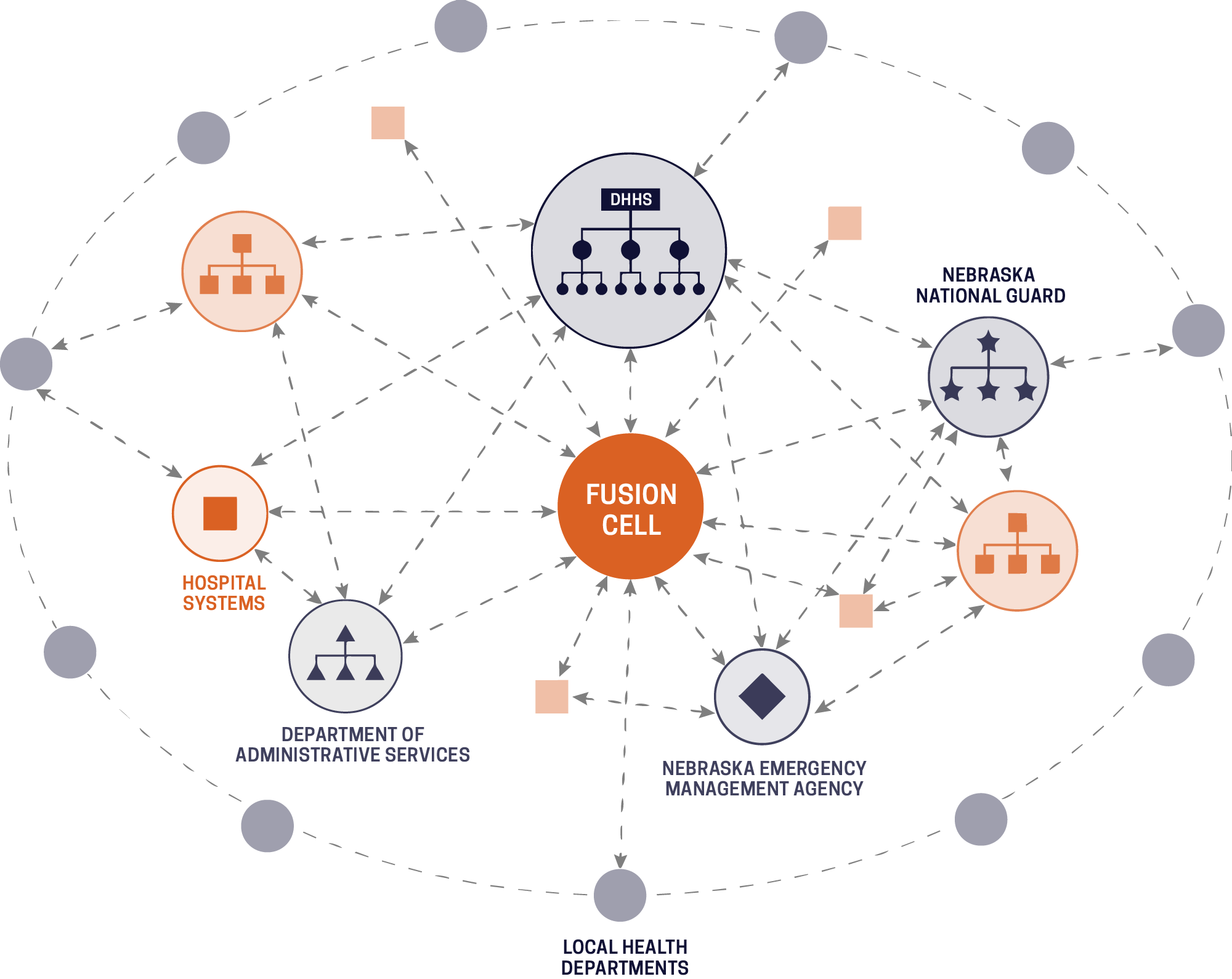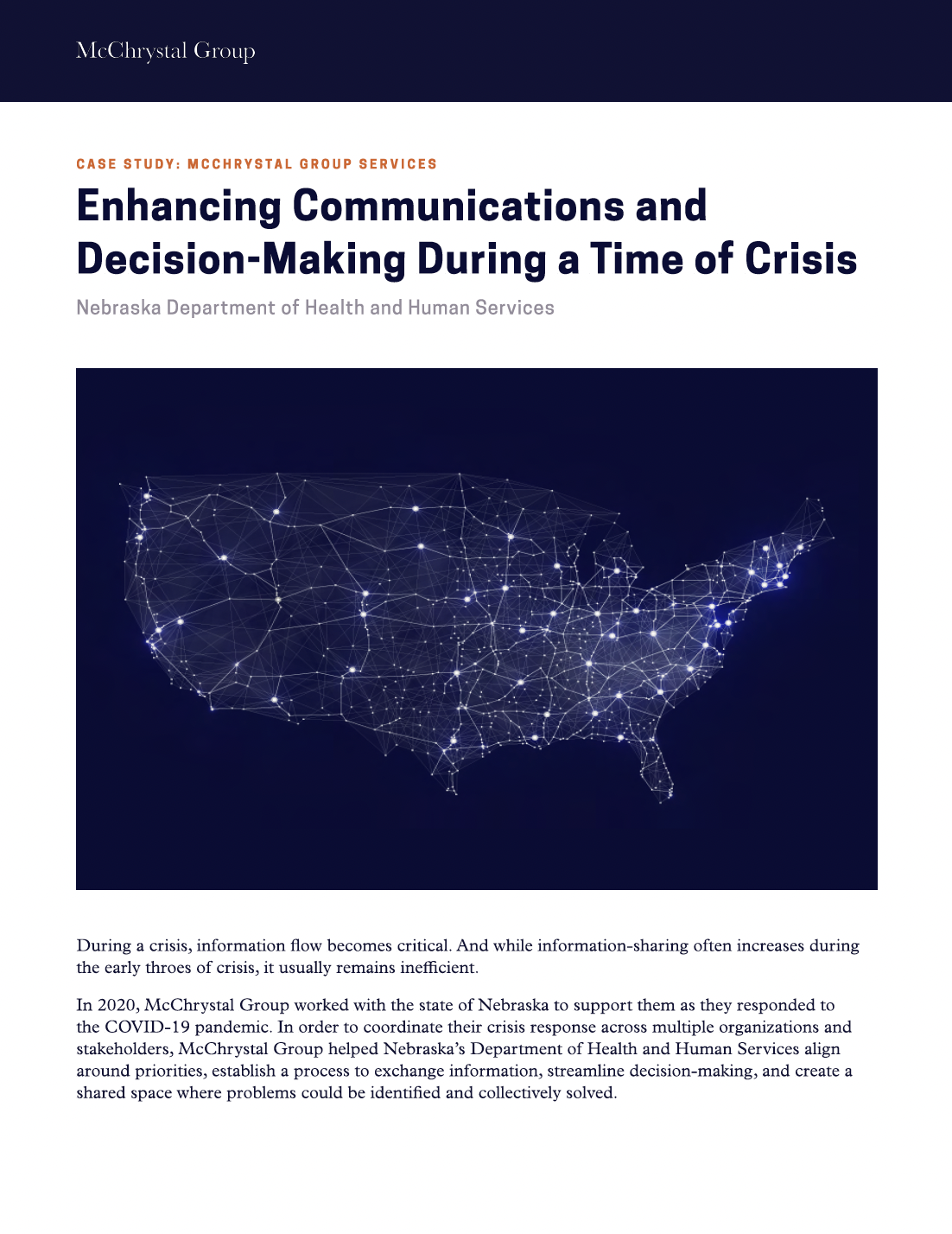During a crisis, information flow becomes critical. And while information-sharing often increases during the early throes of crisis, it usually remains inefficient.
In 2020, McChrystal Group worked with the state of Nebraska to support them as they responded to the COVID-19 pandemic. In order to coordinate their crisis response across multiple organizations and stakeholders, McChrystal Group helped Nebraska’s Department of Health and Human Services align around priorities, establish a process to exchange information, streamline decision-making, and create a shared space where problems could be identified and collectively solved.
Challenges
No single source of truth
Key stakeholders lacked a “single source of truth” for crucial information. Stakeholders had simultaneously too much and not enough information. They all had a large number of meetings on their calendars but these were organized around subsets of stakeholders and/or specific topic areas—not providing context relevant to the group as a whole.
Poor stakeholder engagement, tracking and accountability
While many key stakeholders had been making significant headway in their pandemic response, a surprising number were not regularly or formally connected to one another. Connections between many field operators and decision-makers were incomplete, and follow-through and transparency on key decisions and actions were limited.
This disconnect between stakeholders allowed for multiple pandemic responses to run in parallel, leading to inefficiencies. Decisions made without stakeholder awareness, or wide dissemination of the decisions themselves, eroded trust and slowed action.
Solutions
Efficiently convert information into intelligence to keep pace with the crisis environment
McChrystal Group worked with stakeholders to identify key lines of effort, and established a bi-weekly, cross-functional, intelligence-sharing forum. McChrystal Group coached participants and structured the information exchange to provide context and explain the consequences for decisions. This allowed participants find ways to remove roadblocks, leverage successes, and identify opportunities to connect offline to pursue shared goals.
Establish center-field connection to provide a unified response to COVID-19
Bi-weekly meetings continuously connected responders and decision-makers, and adapted to shifting realities on the ground, while retaining alignment to overall goals. For both broad pandemic response and vaccine rollout, the meetings provided a streamlined flow of information that connected multiple levels of leadership directly with field operations. These connections allowed leadership to share decisions once they’d been agreed upon, identify decisions that still needed to be made, and track accountability for actions. Connecting operations with multiple data flows allowed field personnel to help interpret and use the data they needed on-the-ground.
Develop adaptability to pivot and meet a changing challenge
McChrystal Group worked with key stakeholders to continuously evaluate the flow of intelligence against the shifting crisis environment. By determining what was working and what was not, the team was able to pivot to meet new elements of the ongoing crisis, and identify and get ahead of challenges. A tightly arranged but flexible structure allowed the team to add or subtract stakeholders where necessary to face the shifting crisis.
Impact

Established a reliable cross-functional intelligence-sharing forum
By establishing a “single source of truth,” the state was better able to coordinate their pandemic response, allowing stakeholders to eliminate multiple meetings—reclaiming the time to focus on pandemic response. Structuring and openly sharing information, along with greater transparency on decision-making and follow-through, dramatically bolstered trust and interoperability across the diverse stakeholder group. The state has effectively pivoted these structures to adapt not only to the ongoing pandemic, but to also embrace a broader range of preparedness and challenges shared within the public health community.
Achieved significant increase in vaccine distribution
Pivoting to create structures to specifically address the vaccine rollout allowed Nebraska to move from 45th in the national rankings to 12th in the course of about four months. The effort also built connections between multiple data sources and allowed for training and communications that enabled the state to decentralize vaccine distribution in a sustainable manner, accessible to a diverse and dispersed population.





